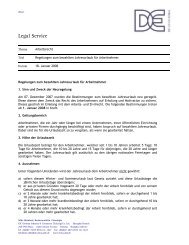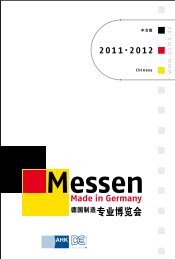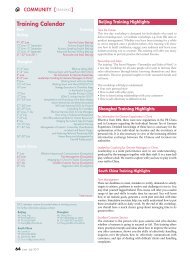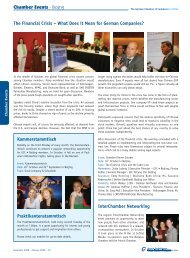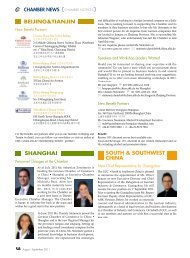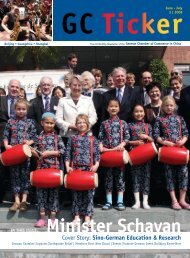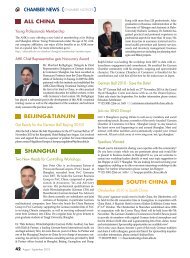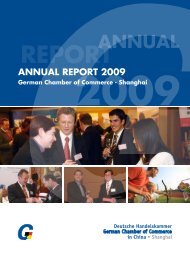Minister Steinmeier - AHKs
Minister Steinmeier - AHKs
Minister Steinmeier - AHKs
You also want an ePaper? Increase the reach of your titles
YUMPU automatically turns print PDFs into web optimized ePapers that Google loves.
Business Focus<br />
Sino - German Business<br />
Holding up<br />
Half the Sky<br />
Female Managers in China<br />
Chinese tradition promotes equality, including<br />
gender equality. Chairman Mao himself<br />
noted, “women hold up half the sky,”<br />
emphasizing the importance of their contribution<br />
to society. Leading business magazines<br />
including Time, Fortune and The Wall<br />
Street Journal have reported difficulty for<br />
female expat managers in China. In general,<br />
fewer expat women than men are working in<br />
China. Many of the women working here are<br />
younger or do not have children, most likely<br />
because of the concerns and challenges<br />
presented by moving overseas.<br />
However, due to the convenience of having<br />
an ayi and the family-friendly nature of<br />
Chinese culture, many expat women find a<br />
stay in China to be comfortable once they’ve<br />
arrived. The managers GC Ticker interviewed<br />
all find the environment in China to be more<br />
favorable for and respectful of female managers<br />
than many studies have demonstrated.<br />
Expat women in China even tend to look<br />
at their Chinese counterparts with a bit of<br />
envy. More Chinese women study subjects<br />
which are traditionally male-dominated,<br />
such as physics, engineering and machinery<br />
where the gender ratio is much closer to<br />
50:50. While programs exist to do the same<br />
in Germany, societal constraints have not<br />
yet been overcome. More Chinese women are<br />
able to stay in the workforce due to childcare<br />
infrastructure, not to mention they only have<br />
one child. This greatly affects the amount<br />
of time they need to take off from building<br />
their career compared with Germans.<br />
Despite the increased presence of women<br />
in these fields, these gains do not translate<br />
into increases in income. According to the<br />
World Economic Forum 2007 survey, Chinese<br />
women make roughly 66% as much as<br />
Chinese men in the same field, while German<br />
women earn 76% of the salary their male<br />
counterparts take home.<br />
What challenges remain for both expat and<br />
local women in China? Five female senior<br />
managers of German companies share their<br />
experiences and opinions on the advancement<br />
of women in China.<br />
August - September 2008 | 12<br />
Terese Bareth<br />
CEO & Principal Consultant<br />
Bareth Management Consultants<br />
In 1982, Terese<br />
Bareth began<br />
taking Chinese<br />
courses, which<br />
brought her to<br />
Beijing for study<br />
from 1986-1989.<br />
Upon graduation,<br />
she returned to<br />
China as Manager<br />
of Controlling and Company Development<br />
for a major German automotive supplier.<br />
Afterwards, she founded her own consulting<br />
company in Shanghai.<br />
When asked about her experience in China,<br />
Bareth commented: “I feel like a human<br />
being here, with equal rights and opportunities<br />
and this is a great feeling.” She finds less<br />
gender discrimination here than in Germany,<br />
citing the high numbers of women studying<br />
machinery or physics in China. “It’s easier<br />
here for professional women, grandparents<br />
are willing to take care of the children. In<br />
Germany, grandparents are more independent<br />
so they are willing to help on occasion, but<br />
not every day.”<br />
Chinese women generally also receive much<br />
more equal treatment in the workplace<br />
when compared to Germany in her opinion.<br />
However, promotions can be problematic<br />
when a woman is promoted above her male<br />
peers. However, she notes this happens in<br />
many situations when one employee receives<br />
a promotion, not only because of gender. Over<br />
the past 20 years, Bareth has noticed a lot of<br />
very positive changes. Now, Chinese women<br />
can go anywhere, the world is open for them.<br />
In major cities, some can decide to have a<br />
career instead of children, and although still<br />
rare, Chinese parents and husbands are slowly<br />
beginning to accept this.<br />
The biggest challenge Bareth sees for women<br />
managers in China is for Chinese female<br />
managers working in global companies.<br />
While they may achieve high-ranking positions<br />
here, it is very difficult for them to be<br />
sent to Europe or North America as a female<br />
Asian manager. This puts a limit on their<br />
advancement in a company headquartered<br />
in Germany. A second challenge is the wage<br />
gap. A former manager once remarked to her,<br />
“Hire a woman who will work harder than two<br />
men for half the price.”<br />
The German Chamber of Commerce in China<br />
Katrin Braun<br />
Managing Director, Asia<br />
Machwürth Team International (MTI)<br />
Katrin Braun took<br />
advantage of her<br />
electrical engineering<br />
background to<br />
climb the career<br />
ladder at Siemens<br />
in Germany before<br />
moving to China<br />
three years ago.<br />
She pushed for the<br />
change after experiencing the rewarding work<br />
climate on business trips. She acknowledges<br />
that for most women who already have or are<br />
planning to have families, working abroad<br />
proves difficult. However, the support of her<br />
husband and their two children made the move<br />
possible.<br />
After her subsidiary was sold, she decided to<br />
take up Mandarin study and considered starting<br />
her own business. During her transition, former<br />
colleagues referred her to her current position at<br />
MTI. The opportunity came at the right time, as<br />
services are expanding in MTI’s realm of organizational<br />
development.<br />
When asked about how she perceives gender<br />
relations here in China, she remarked that the<br />
situation is more relaxed than in many Western<br />
countries. Professionally, women have much more<br />
say than in Germany, and are equally respected<br />
by male colleagues. However, the private vs. professional<br />
spheres contrast each other greatly.<br />
In the household, Chinese women still run the<br />
show, playing the role of executive by day and<br />
homemaker by night.<br />
As far as management strategy is concerned,<br />
Braun doesn’t feel as though she had to adjust<br />
her plans to consider potential gender conflicts.<br />
Instead, she was able to focus more strongly on<br />
the barriers created by linguistic and cultural<br />
differences. She emphasizes, “In China, you<br />
have to check progress more often, and give<br />
positive feedback. Many German managers give<br />
negative feedback without positive reinforcement,<br />
but in China you need to consider that<br />
professional relationships are much more<br />
personal.”<br />
Compared to German women, Braun notes that<br />
Chinese women have several advantages. Chinese<br />
women only have one child, and ayis and grandparents<br />
help. As a result, Chinese women continue<br />
working, and don’t lose the 5 to 10 years<br />
that German women do when having children.





